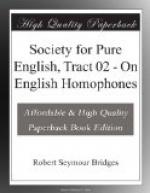[Footnote 20: A fair list might no doubt be made; the most amusing item would be—Ophelia = aphelia: then illusion = elusion, paten = pattern, seaman = seamen, phial = file, custody = custardy, and of course verdure = verger and fissure = fisher. It would also allow partition = petition, proscribe = prescribe, and upbraid = abrade! I take these from the first edition.]
[Sidenote: Example of one class.]
But number is not so important as the quality and frequency of the words involved, so I will instance one class in detail, namely the words in which aw and or are confused. Here are a dozen of them:
core = caw. door = daw*. floor = flaw*. hoar* = haw. lore* = law. more = maw*. oar, ore = awe*. pore = paw. roar = raw. soar, sore = saw, saw. tore = taw. yore* = yaw.
Of these 12 words, 6 exhibit stages or symptoms of obsolescence. I should think it extremely unlikely that yore has been in any way incommoded by yaw; and flaw, which is now more or less cornered to one of its various meanings, was probably affected more by its own ambiguities than by floor; but others seem to be probable examples: shaw and lore, and I think maw, are truly obsoletes, while hoar and daw are heard only in combination. Awe is heard only in awful, and has there lost its significance. I should guess that this accident has strengthened its severity in literature, where it asserts its aloofness sometimes with a full spelling [aweful] as in speech two pronunciations are recognized, awful and awf’l.
Now how do these words appear in Jones’ dictionary? If there is to be any difference between the aw and ore sounds either the R must be trilled as it still is in the north, or some vestige of it must be indicated, and such indication would be a lengthening of the o (=_aw_) sound by the vestigial voicing of the lost trill, such as is indicated in the word o’er, and might be roughly shown to the eye by such a spelling as shawer for shore [thus shaw would be [s][o]: and shore would be [s][o]:[e]] and such distinction is still made by our more careful Southern English speakers, and is recognized as an existent variant by Jones.
Since the circumflex accent properly indicates a rise and fall of voice-pitch on a vowel-sound such as almost makes a disyllable of a monosyllable (e.g. in Milton’s verse the word power may fill either one or two places in the line) I will adopt it here to denote this fuller and differentiating pronunciation of ore.
Now to all these words, and to the finals of such words as ad[ore], impl[ore], ign[ore], Jones gives the diphthongal aw as the normal South English pronunciation, and he allows the longer [ore] sound only as a variant, putting this variant in the second place.




